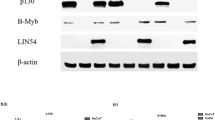Abstract
AP-1 transactivation appears to be required for mouse JB6 cell neoplastic transformation induced by the tumor promoter TPA or epidermal growth factor (EGF). Exposure to AP-1 transrepressing retinoids and glucocorticoids and expression of a dominant negative c-jun (TAM67) blocked tumor promoter-induced AP-1 transactivation and neoplastic transformation. The aim of the present study was to extend the inquiry of the role of AP-1 and other transcription factors to human neoplastic progression. Expression of human papillomavirus (HPV) 16 or 18 E6 and E7 immortalizes human keratinocytes and inhibits serum/calcium-stimulated differentiation. Further transformation by v-fos co-expression renders these keratinocytes tumorigenic in nude mice. We have analysed two series of E6/E7 immortalized human keratinocyte cell lines that show progressing phenotypes ranging from differentiation sensitive to anchorage-independent to tumorigenic in nude mice. We analysed the activities of AP-1 and NF-κB which may `cross-talk'. Both DNA binding and transactivation of AP-1 and NF-κB transcription factors showed elevation in the anchorage-independent (16RH) and tumorigenic (18 v-fos) keratinocyte lines compared to the less progressed but immortalized cell lines. HPV E7 was expressed at a constant level shown by quantitative RT-PCR in both the more and the less progressed lines, indicating that E7 is not the factor limiting this progression. Blocked shift/supershift analysis indicates that Fos family member proteins especially Fra-1 and Fra-2 are related to progression and no changes found in the Jun family member proteins although they are present in the AP-1/DNA binding complex. When a dominant negative mutant c-jun driven by a human keratin 14 promoter was co-transfected with AP-1 or NF-κB reporters, both AP-1 and NF-κB activities were suppressed in the more progressed cell lines 16RH and 18 v-fos but not in the less progressed 16RL or 18 cell lines. Overexpression of the same dominant negative c-jun did not inhibit p53 dependent reporter transactivation, indicating the specificity of inhibition of AP-1 and NF-κB transactivation in the HPV-immortalized cells. Stable transfectants of this mutant c-jun in the two more progressed cell lines 16RH and 18 v-fos showed reduced AP-1 and NF-κB activation and reduced anchorage-independent growth. Together, these results indicate that activation of AP-1, NF-κB or both may contribute to neoplastic progression in HPV immortalized human keratinocytes and that specific targeting of the elevated levels seen in benign or malignant tumors might be effective for prevention or treatment of human cancer.
Similar content being viewed by others
Author information
Authors and Affiliations
Rights and permissions
About this article
Cite this article
Li, JJ., Rhim, J., Schlegel, R. et al. Expression of dominant negative Jun inhibits elevated AP-1 and NF-κB transactivation and suppresses anchorage independent growth of HPV immortalized human keratinocytes. Oncogene 16, 2711–2721 (1998). https://doi.org/10.1038/sj.onc.1201798
Received:
Revised:
Accepted:
Published:
Issue Date:
DOI: https://doi.org/10.1038/sj.onc.1201798
- Springer Nature Limited
Keywords
This article is cited by
-
CD147 mediates epidermal malignant transformation through the RSK2/AP-1 pathway
Journal of Experimental & Clinical Cancer Research (2022)
-
Sirtuin 6 inhibition protects against glucocorticoid-induced skeletal muscle atrophy by regulating IGF/PI3K/AKT signaling
Nature Communications (2022)
-
Reactive oxygen/nitrogen species and their functional correlations in neurodegenerative diseases
Journal of Neural Transmission (2012)
-
Regulation of HGF-mediated cell proliferation and invasion through NF-κB, JunB, and MMP-9 cascades in stomach cancer cells
Clinical & Experimental Metastasis (2012)
-
Downregulation of tumor suppressor Pdcd4 promotes invasion and activates both β-catenin/Tcf and AP-1-dependent transcription in colon carcinoma cells
Oncogene (2008)




